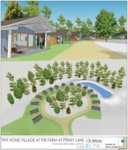




PITTSBORO — On a bright October morning, Thava Mahadevan heads down a gravel pathway to a clearing surrounded by orange construction tape and a circle of trees just beginning to fade in color. At the moment, the construction site itself isn’t particularly impressive; white stakes in the ground demarcate plots of land and a septic route while tire tracks etch the soft mud of the property.
But through Mahadevan’s eyes, it’s the foundation of a dream years in the making.
In 2009, when Mahadevan purchased 40 acres of farmland in a neighborhood off Chapel Hill Road in Pittsboro, the idea of one day creating a space for safe, affordable housing was just a hopeful vision.
A licensed clinical addiction specialist and director of operations at the UNC Center for Excellence in Community Mental Health, he founded the Farm at Penny Lane in 2012 using a “holistic and sustainable approach” to improve the quality of life for those with serious and persistent mental illness.
Over the next 10 years, Mahadevan and his team at the Farm at Penny Lane saw the development of the organic therapeutic farm and its recovery-oriented programs, from music and yoga classes to animal-assisted and horticulture therapies. Addressing social determinants of health and centering those with lived experiences are at the core of the Farm’s practices.
“So it’s a place to really build on the notion that collective impact makes a big difference,” Mahadevan, who also serves as executive director of local nonprofit Cross Disability Services, said.
Now, the Farm is getting closer and closer to seeing another part of its community finally in practice: the Tiny Homes Village.
Through a public-private partnership led by Cross Disability Services (XDS Inc.) and UNC-Chapel Hill School of Social Work, the THV aims to provide permanent, supportive and affordable housing for those living with serious mental illness (SMI) in Chatham County.
The Tiny Homes Village, located on the grounds of the Farm at Penny Lane, will have 15 tiny homes; each will be built on a permanent foundation and encompass around 360 square feet. Five of the homes will be reserved for veterans with chronic health conditions, and the village will also have an outdoor pavilion and a clubhouse with fitness and cooking facilities.
The homes will follow a permanent supportive housing model in which residents sign a standard North Carolina annual lease and pay a third of their income in rent on a monthly basis. Mahadevan said he expects most people to pay around $250.
Finding stable housing can be a challenge for those with mental health conditions; not having access to a safe place to live can lead to cycles of experiences of homelessness, with the criminal justice system or hospitalizations, according to the National Alliance on Mental Illness.
Further, it’s important that housing is not only accessible, but affordable. NAMI reports that people with serious mental illness are often on Supplemental Security Income (SSI), a federal program designed to help older adults and people with disabilities, who have little or no income, meet basic needs through monthly cash payments. Still, NAMI states that SSI averages 18% of the median income, underscoring the challenges of finding affordable housing.
Social determinants of health, like housing, are non-medical circumstances that shape health outcomes and health equity. Other social determinants of health include socioeconomic status, education, experiences of racism and food insecurity. Researchers believe these factors can influence more than 80% of a person’s health outcomes.
“We’re proposing to build communities that are like any other community, and where there’s lots of in-roads in and out,” says Dr. Amy Blank Wilson, co-director of the project. “And it’s just one option in a continuum of housing options for people with serious mental illness.”
Blank Wilson, an associate professor at UNC’s School of Social Work, helped to develop the project and the partnership between the school and XDS Inc. In 2015, she was selected for the C. Felix Harvey Award, an interdisciplinary award honoring a faculty member with a project that apply humanities or social science methods to positively impact groups outside of UNC-Chapel Hill.
“This is really a project about building a new form of affordable housing, providing proof of concept that tiny homes can be used as a new form of affordable housing for people with serious mental illness,” she said.
With the support of the award, Blank Wilson led a team of researchers in carrying out a program evaluation using a 326-square-foot model home to gain stakeholder feedback and determine the best way to design the Tiny Homes Village. The model home used in the evaluation was originally built in collaboration with Chatham Habitat at the Chatham County Fair, and later permanently brought to the farm property.
A 360-degree tour of the model home can be viewed on the THV website; the home includes a U-shaped kitchen, small living space with a pull-out couch, a bedroom and a bathroom with a shower and toilet. All the homes will be constructed identically and furnished with basic furniture and will meet N.C. residential building standards. The construction price for each home will be between $50,000 and $54,000.
During a tour, Mahadevan also pointed out how certain aspects of the home were designed with the individuals who will one day be occupying the house in mind, including using neutral paint colors on the walls to avoid triggering certain emotions and centralizing laundry services in the clubhouse to encourage more informal social interaction.
Blank Wilson emphasized that both she and Mahadevan see housing as a form of health care and share a desire to prioritize research methods that center the experiences and needs of the people they’re aiming to serve. Building research intervention methods into the project in its early stages was crucial.
“I love to build interventions,” she said. “And to me, housing is an intervention.”
The evaluation of the model home had four focus groups, which included those living with mental illness, service providers and policymakers. Participants with lived experience also stayed overnight in the home as part of the evaluation.
“Our design of the home and the villages, we dream that the design is centered on the thoughts and experiences of people with lived experience and the people working to support them in the community,” Blank Wilson said. “So that’s cool. To me, there’s not many times in my life, as a researcher, I get to do that in terms of being in from the ground up.”
The evaluation and feedback from participants shaped the development of the project through a set of common recommendations, which the THV website states included:
• Maximizing natural light and use of outdoor spaces
• Designing flexible living areas
• Ensuring accessibility
• Ensuring privacy
• Building a community
• Maximizing connectivity
In total, the project has raised more than $2 million in funds from a number of sources, including Chatham County government and the Oak Foundation. The project is currently in its fourth phase of construction, working on vertical construction of the homes, and expects to finish horizontal construction and sewer infrastructure by the end of this month. Students from N.C. State’s “Design + Build” summer studio also designed and built the pavilion, the first building erected in the community in 2021 in just eight weeks.
Mahadevan said he hopes to see individuals move into the homes by next summer. Residents will be selected from clientele at the Center for Excellence in Community Mental Health. The SSW, XDS Inc., Center for Excellence in Mental Health and the property management company are in the process of developing a resident selection team to formulate resident criteria and review and select applicants to live in the community.
“I’m kind of giddy and also a little anxious, because we’ve come a long way from six years ago, worked through all the planning issues, the water issues,” Mahadevan said.
Despite recent gains, there is still not nearly enough affordable housing in Chatham County. There was more than a 25% increase in low-income renter households from 2019 to 2021, but only a 13% increase in available affordable units during the same period, according to a report from earlier this year by the county’s Affordable Housing Advisory Committee.
Stephanie Watkins-Cruz is a former policy analyst for Chatham County and the director of housing policy at N.C. Housing Coalition, a nonprofit based in Durham. In 2020, as a staff liaison, Watkins-Cruz helped to administer the county’s Housing Trust Fund, which was created to provide grants and low-interest loans to projects that support affordable housing units in Chatham. Chatham’s Board of Commissioners approved around $100,000 in funds to support the Farm at Penny Lane in its tiny homes project for both years the Farm applied for funding.
Watkins-Cruz said the project is a “brilliant example” of a successful public-private partnership, and that permanent supportive housing in this form under the Farm was the first of its kind in the county from a non-private provider. It’s important to remember that housing is not a political issue, Watkins-Cruz said — it’s a human issue.
Part of what the THV does in being “supportive housing” is bringing services directly to its community, which she said is important.
“And so we all have barriers to housing that some are soft and really manageable and navigable, but they’re not soft for everybody, and they’re not easily navigable for everybody,” Watkins-Cruz said. “And so this really brings in the affordability piece, and the need to have services on site to just really bring healthy, full quality of life to, I think, individuals that really would find it very difficult otherwise — anywhere, not just Chatham, but anywhere.”
And while the affordable housing crisis will undoubtedly continue to be reflected in Chatham — especially with the arrival of major economic development projects that promise nearly 10,000 new jobs — Watkins-Cruz also noted that in the last four and a half years, the county has invested in the creation of 164 housing units and preservation and repair of around 100 housing units for low- or moderate-income families.
Ultimately, it is crucial to continue fostering public-private partnerships that listen to a community’s need in addressing affordable housing gaps, she said.
“I think it’s really easy for it to seem as if it’s on the syllabus of one entity, but I think Penny Lane is a really good example of how it can’t be,” Watkins-Cruz said. “So you can’t go out and say, it is on the county to flip the entire job. You also can’t say it’s on the town, to flip the entire book, you absolutely can’t say it’s on a nonprofit to split the entire bill. And it has to be a combination of these sources, we have to have private partners, you know, partnering [as] true partners with the community.”
Aside from his professional experiences working in the field of mental health and psychiatry, seeing the Tiny Homes Village come to life is personal for Mahadevan, too.
As a teenager growing up in Colombo, Sri Lanka, Mahadevan and his older brother were forced to escape the country in 1983 due to ethnic conflict and the ensuing civil war. Mahadevan is Tamil, a smaller minority group in the country, and at the age of 16 fled to Chennai, India, to avoid being recruited to join the resistance movement. After arriving in India as a refugee, Mahadevan said he experienced homelessness.
“Housing is very personal to me, in that sense, having safe, affordable housing because without having a safe place to live, it’s really hard to do everything else,” he said. “You’re sort of thinking, ‘Where am I going to sleep tonight? Before I can think of, I need medicine and everything else long term.’”
Blank Wilson said it’s been exciting to watch people engage with the idea of the THV because it captures the imagination of diverse stakeholders within a community.
After the article on the program evaluation was published, she said it caught the attention of the larger research community, and she fielded questions about the best ways to bring the THV to multiple communities. But Blank Wilson said that with the housing project at the Farm at Penny Lane, the focus has always been very local and intentional in designing homes in ways that are supportive of the needs of the people who will live there. When it comes to replicating the THV in other areas, Blank Wilson again reiterated that the village is just one option among a larger continuum of choices and said it’s important that any replications are tailored to the community they are in.
Similarly, Mahadevan said incorporating affordability, permanency and supportive services into a project like the Tiny Homes Village is key. He envisions one future in which there are similar projects across the state between a local community and one of UNC’s 16 campuses, bringing the university’s resources to a particular group.
Some 10-odd years after first purchasing the land to build out the Farm at Penny Lane, when the THV was just a seed of an idea, Mahadevan said the project has energized him and completely changed his way of thinking.
“It certainly gives me goosebumps every time I think it’s really happening now,” he said.
Blank Wilson recalled her speech at the THV’s groundbreaking, when she said “hope is a powerful medicine” and that this project brings hope. Throughout project development, she’s been moved and surprised by the commitment different stakeholders have had in bringing the village to fruition.
“I can’t wait to see people move in,” she said. “I am so excited to just bear witness to that journey and that process, and to see houses become homes to people.”
Reporter Maydha Devarajan can be reached at mdevarajan@chathamnr.com and on Twitter @maydhadevarajan.